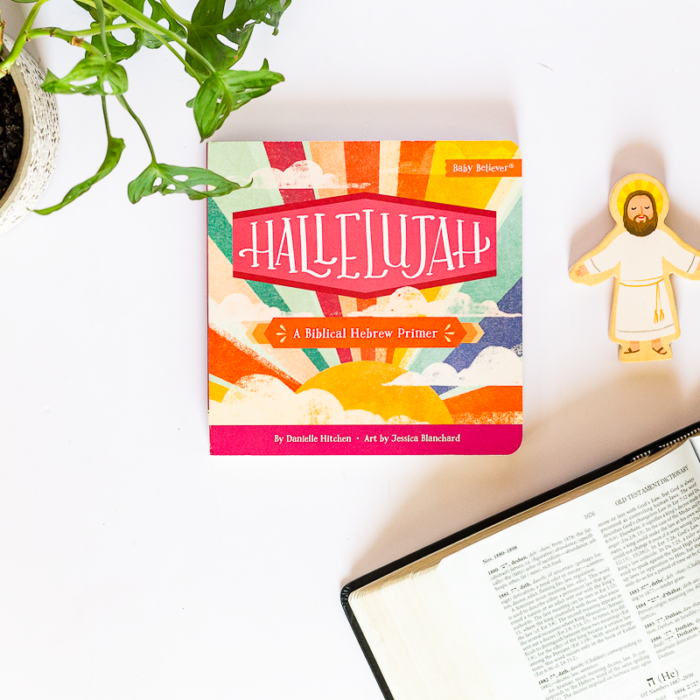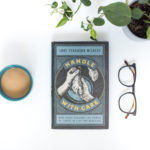This post contains affiliate links
Handle With Care: How Jesus Redeems the Power of Touch in Life and Ministry is the debut title by Lore Ferguson Wilbert. When I had the opportunity to review Handle With Care, I jumped on it. I had seen this book highly recommended and promoted on social media and suspected it would be a good one. As I began reading the book, one of the first things I observed is that Lore is a natural wordsmith. Her words drew me in and I found myself compelled to keep reading whatever came next.
Handle With Care begins with Lore sharing about how she endured sexual abuse in her early years. Reading about this was absolutely devastating. I’m grateful for Lore’s willingness to share her pain in a public manner in order to help other Christians know how we can truly care for those who are hurting from sexual abuse. It is inspiring to know that she is using what was meant for evil against her to glorify God and encourage others. Lore’s book is amongst those in a growing genre that explores the theology of the body. As one who has endured postpartum depression, this area of study has greatly intrigued me. Handle With Care is a book focused on the theology of touch which is something I hadn’t thought about much before. I don’t consider myself to be much of a touchy-feely person but I have many brothers and sisters in Christ who do fall into that category so reading Handle With Care opened my eyes to some ways that I can care for them.
I am deeply grateful that Lore dedicated much of the book to exploring the embodiment of humanity. My experience with postpartum depression was made more difficult by the voices of other Christians who had made the general claim that depression is sin. Resulting from my experience has been the desire to examine the notion of human embodiment from a biblical perspective. Lore spoke of this as she addressed the idea of self-care on page 92, “I could see. . . what was happening when Jesus healed people’s physical bodies. The kingdom of heaven was coming to earth, and it was changing bodies, not just in eternity, but on earth too. Yes, those healings and miracles were signposts that pointed to the spiritual realities of God’s ability to rescue and regenerate and restore, but the fact still remains that Jesus cared for people’s bodies.” I love that she also pointed out that, “Jesus Himself cared for His own earthly body when it required the things all bodies require-this is why we see Him eating, drinking, sleeping, stopping to rest at a well, and so on. To be like Jesus, we must submit to the reality that we have physical limitations and requirements for our bodies to function and carry out the vocation and purposes God has intended,” (pg. 93-94).
As Lore explored the idea of touch in various contexts she shared her thoughts on masturbation. She wrote, “Most of us will experience a season where we lack a spouse to give relief or release for the biological itch for sexual comfort. Many of us will be in a marriage where mutual relief or release is unavailable for long seasons. How do we operate in that space regarding self-touch without the sin of lust, without the sin of worshipping our felt-desire, or the sin of neglecting the common grace of touch? How does God’s design and attentiveness to the body, the necessity of our care for our bodies, submitting ourselves to the biological inclination for comfort and pleasure, and the proclamation against sexual sin inform something like masturbation? Dear reader, here’s the hard news: I do not know” (pg. 105). I felt simultaneously grateful for Lore’s humility and honesty yet uncertain about her conclusion. On page 106 she continued, “Because the Bible is so silent on this issue, it has always been helpful for me to think about prolonged singleness, or times of celibacy, as seasons of fasting-which the Bible does speak much about,” (pg. 106). I believe this idea fits in well with the cultivation of self-control, as mentioned in 1 Corinthians 7:8-9, “To the unmarried and the widows I say that it is good for them to remain single, as I am. But if they cannot exercise self-control, they should marry, For it is better to marry than to burn with passion,” (Also see Galatians 5:22-24). She helps readers understand that God sustains His children even in seasons of sexual abstinence because He is, “. . . the one who provides all you need and who helps you order your desires rightly and who holds you when you fall and helps you get back up and carries you when the way seems too hard,” (pg. 108).
While I greatly respect her honesty and understand how she arrived at her thoughts, I believe that there is a case for sexual activity to occur only within the confines of marriage as it is defined biblically (Genesis 2:24, 1 Corinthians 6:18-20, Hebrews 13:4). While the Bible doesn’t explicitly say that masturbation is a sin, it does inform us to flee sexual immorality which refers to sexual activity outside of marriage. 1 Corinthians 6:18-20 says, “Flee from sexual immorality. Every other sin a person commits is outside the body, but the sexually immoral person sins against his own body. Or do you not know that your body is a temple of the Holy Spirit within you, whom you have from God? You are not your own, for you were bought with a price. So glorify God in your body.” I don’t know that masturbation presents the opportunity for us to glorify God with our bodies.
In the Song of Solomon, the warning is given three times to not stir up or awaken love until the right time (Song of Solomon 2:7, 3:5, 8:4). The right time in the context of the Song of Solomon is the consummation of a marriage between a man and a woman. Personally, I caution against masturbation. In 1 Corinthians 7:3, the instruction Paul gives to married men and women is to give each other their conjugal rights. The inference here, if we consider that the marriage relationship is supposed to reflect Christ’s relationship to His bride, the church, is that sex is an opportunity for serving rather than for being served. I don’t see how masturbation fits within that opportunity. I suppose, like Lore, I can’t say that masturbation is explicitly mentioned in the Bible as a sin. For the sake of clarity, and ultimately, charity, I don’t believe that what Lore wrote is untrue but I do believe the conversation is perhaps a bit more nuanced. In order to care for my blog readers, I felt it important to note this. I understand that within a book, authors are limited to a word count which then limits how much time and attention they can dedicate to specific topics. Since my book reviews aren’t limited to a certain number of words, I found it important to use this one to expound on that idea a bit further.
I am so thankful for the chapter Lore wrote on singleness and wish it had been around during my single years. On page 115 she highlighted the general truth that “Singles are often overlooked in church life, church planting, church leadership, family hospitality, church picnics, and more.” She encouraged men and women in the church to welcome single people by including them in the various aspects of church life. Regarding this, she wrote, “When our unmarried brothers and sisters show up to participate in the life of the church, it is an expression of the gospel to recognize their involvement, desire their perspective, and to love them with our touch. To remind them: I see you and know you are a body, a complex person who is not simply a pair of serving hands or missional feet, but an embodied soul who needs other embodied souls with whom to mingle,” (pg. 115-116). This served as such a great reminder to me of the need to faithfully care for my single brothers and sisters.
Having grown up in an era in the church that began what is now referred to as “Purity Culture,” I found the chapter True Love Doesn’t Wait to Touch particularly interesting. Regarding this, Lore encouraged single people with the truth that, ‘. . . God’s not wasting our dating years. He’s at work within our sacrifice of not taking what we want before its time. He’s at work, making us into a person for whom Jesus is worth everything. He is changing us into people whose ultimate prize is Christ-not marriage, not a relationship, not sex, and not virginity,” (pg. 160-161). What a beautiful and necessary reminder that Jesus is the prize regardless of one’s station in life.
I really enjoyed Handle With Care and highly anticipate reading more by Lore in the future.
I received Handle With Care compliments of B&H Publishing in exchange for my honest review.






